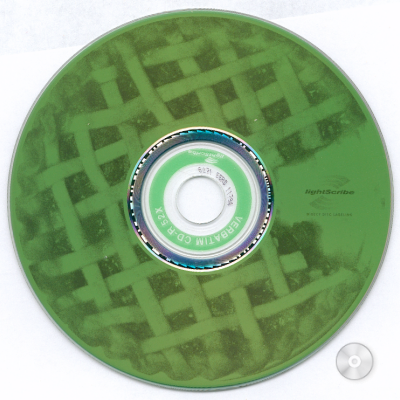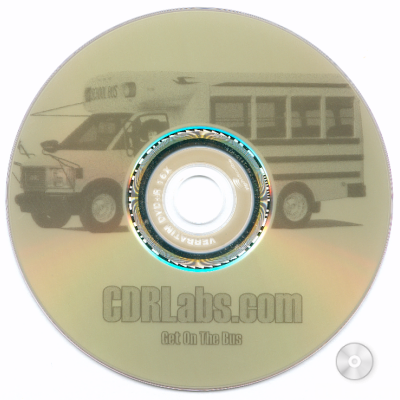
What's in the box?:
- ASUS DRW-1814BLT 18x DVD±RW/RAM Drive
- Quick Setup Guide
- Nero Software CD
- CD Case
- 2 Verbatim LightScribe 52x CD-R Discs
- Mounting Screws
Physical Features:
The drive we purchased for this review was manufactured in January of 2007 and had firmware 1.04.For this review we used firmware versions 1.04 and 1.10.
From the front, the DRW-1814BLT looks very similar to ASUS's previous 16x DVD±RW drive, the DRW-1612BL. The two drives not only share the same bezel design, but have many of the same logos. Along with the large "ASUS" logo, you can see a few showing support forthe DVD+ReWritable and DVD Multi specifications as well as technologies like QuieTrack and LightScribe.
Below the tray you can see the DRW-1814BLT's single LED. Off by default, this LED lights up green when the drive is reading or writing.
The rear of the DRW-1814BLT is fairly straight forward. By looking at the picture below you can see the drive's SATA interface and power connector.
Technical Specs:
Most of the specs below have been taken from ASUS's website and the box that the drive came in.
| ASUS DRW-1814BLT 18x DVD±RW/RAM | |
| CD Write Speeds | 48x, 40x (CAV) 32x, 24x (P-CAV) 16x, 8x (CLV) |
| CD Rewrite Speeds | 32x, 24x (Z-CLV) 16x, 10x, 4x (CLV) |
| DVD+R Write Speeds | 18x, 16x, 12x (CAV) 10x, 8x (P-CAV) 4x (CLV) |
| DVD+RW Write Speeds | 8x (Z-CLV) 6x, 4x, 2.4x (CLV) |
| DVD-R Write Speeds | 18x, 16x, 12x (CAV) 10x, 8x (P-CAV) 4x (CLV) |
| DVD-RW Write Speeds | 6x (Z-CLV) 4x, 2x, 1x (CLV) |
| DVD+R DL Write Speeds | 8x, 6x (Z-CLV) 4x, 2.4x (CLV) |
| DVD-R DL Write Speeds | 8x, 6x (Z-CLV) 4x, 2x (CLV) |
| DVD-RAM Write Speeds | 14x (CAV) 12x (P-CAV) 5x, 3x, 2x (CLV) |
| CD Read Speeds | 48x Max (CD-ROM) 40x Max (CD-R/CD-RW) |
| DAE Speed | 48x Max |
| DVD Read Speeds | 16x Max (DVD-ROM Single Layer) 8x Max (DVD-ROM Dual Layer) 16x Max (DVD-Video) 12x Max (DVD±R) 8x Max (DVD±RW) 8x Max (DVD±R DL) 12x Max (DVD-RAM) |
| Buffer Size | 2MB |
| Access Times |
150 ms (CD-ROM) 140 ms (DVD-ROM) |
| CD Formats | CD-ROM CD-DA CD-Extra Photo CD Video CD CD-Text CD-R CD-RW |
| DVD Formats | DVD-ROM DVD+R/RW DVD-R/RW DVD+R DL DVD-R DL DVD-RAM |
| CD Recording Modes | Disc At Once Track At Once Session At Once Packet Writing Multi-Session |
| DVD+R and DVD+R DL Recording Modes |
Sequential Recording Multi-Session Recording |
| DVD+RW Recording Modes | Random Recording |
| DVD-R and DVD-R DL Recording Modes |
Disc At Once Incremental Recording Multi-Border Recording |
| DVD-RW Recording Modes | Restricted Overwriting Disc At Once Incremental Recording Multi-Border Recording |
| DVD-RAM Recording Modes | Random Write |
The DRW-1814BLT also has many of the same features found on ASUS's other drives, including support for their FlextraLink, FlextraSpeed and QuieTrack technologies. More information on these features can be found in our reviews of the CRW-5224A and CRW-5232AS.
LightScribe:
Note: We took a much closer look at LightScribe technology in our review of the BenQ DW1625. In this review we'll just go over some of the basics and see how the DRW-1814BLT performs with the bundled software.
The DRW-1814BLT is one of the latest drives from ASUS to feature LightScribe technology. Developed by HP, LightScribe lets you burn durable, silk screen quality labels directly onto your CD's and DVD's using the same drive that burned the data. According to HP, it's as simple as burning the data, flipping the disc, and then burning the label.
Of course you can't do this with just any drive, media or software. While LightScribe capable drives use the same laser when burning both the data and label, they have to be able to accurately control the laser's focus and position as well as the spindle speed. They also must be able to recognize LightScribe media. These special discs have a thin dye coating on the label side that absorbs laser light. This triggers a chemical reaction that produces a color change, allowing the user to print text, artwork or graphics.
Even if you have a LightScribe capable drive and media, you will need software that supports it. Most major software companies have pledged support for the technology. However, at the time of this review, the list of compatible software is still relatively short. For the DRW-1814BLT, ASUS turned to Nero. Using the bundled software you can both create and burn LightScribe disc labels.
Once you've created your LightScribe label, you're ready to print it. Before you can do this though, you will need to choose the contrast. Keep in mind this option not only changes the level of detail, it affects the amount of time it takes to print the label. The higher the quality, the longer the process will take.
How long does it take to print a label? For testing purposes, we created a few discs using Verbatim's LightScribe v1.2 DVD+R and color CD-R media. In both cases, the quality has been set to "best". The results are shown below.
More Features:
By looking at the picture below, you can see that ASUS's new DVD writer is identified as an "ASUS DRW-1814BLT".

The Nero screenshot also shows that the DRW-1814BLT has a maximum CD writing speed of 48x and a 2000KB buffer. This buffer is also backed up by ASUS's FlextraLink technology. According to Nero, the drive can write CD-Text and overburn. When testing the drive's capacity, it had no problems overburning up to 99 minutes with CompUSA's 99 minute CD-R media.

Using Alex Noe's Weak Sector Utility we were able to determine that the DRW-1814BLT is a "two sheep" burner. This means that ASUS's new drive is capable of backing up titles protected by SafeDisc 2, including version 2.51.
Here is a screen shot from Nero's InfoTool. This program queries the drive to see what its reading and writing capabilities are. InfoTool had no problems detecting the DRW-1814BLT's maximum reading and writing speeds, recording modes, buffer underrun protection and 2MB buffer.
InfoTool also shows that the DRW-1814BLT is an RPC-2 DVD drive. This means that the drive's region is stored in the firmware. The drive's region can be changed five times and after that it cannot be changed anymore. Unfortunately, a patched RPC-1 firmware is not available for this drive yet.
While InfoTool gives us a quick glance at the DRW-1814BLT's features, DVDINFOpro provides a little more information on some of the drive's reading and writing capabilities. By looking at the screenshot above you can see that while ASUS's new drive can read and write to DVD+R DL, DVD-R DL and DVD-RAM media, it does not support the Mt. Rainier format.
The DRW-1814BLT also supports a feature called "bitsetting." By default, the drive sets the book type of DVD+R, DVD+RW and DVD+R DL media to "DVD-ROM." This feature comes in handy if you have an older DVD player that has problems playing recordable media.











